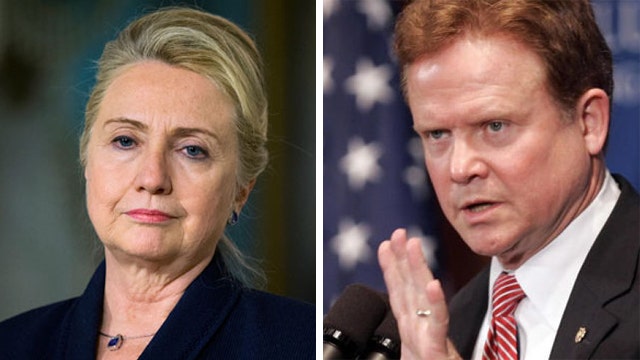Is Jim Webb a viable challenge to Clinton in 2016?
Basil Smikle Jr and Katrina Pierson on whether the former Democratic Virginia Senator has a chance
WASHINGTON – Does Jim Webb have what it takes to give Hillary Clinton a run for her money?
Webb thinks he does, and he fired his first salvo against her last week, announcing in a video on new campaign website that he had formed an exploratory committee as the first step in a possible 2016 run for the White House.
Without mentioning Clinton by name, the former Democratic senator from Virginia stated bluntly that government is “paralyzed” and that he wants to help — not as a “career politician,” but as a public servant — to “re-establish a transparent, functioning governmental system in our country.”
“In my view the solutions are not simply political, but those of leadership,” Webb said. “I learned long ago on the battlefields of Vietnam that in a crisis, there is no substitute for clear-eyed leadership.”
“Obviously he is an incredible long shot,” said Terry Madonna, who directs the Franklin and Marshall College Poll in Pennsylvania. “But as sort of a moderate, more so a centrist, he will obviously have an appeal within the Democratic Party.”
Plus, Madonna said, “There are apparently some Democrats who are not willing to cede the nomination to [Clinton]. Conceivably she could have a real battle on her hands for the nomination by people who are saying, no, you are not just rolling away the nomination, it’s not necessarily yours.”
A Marine Corps veteran, Webb, 68, earned two Purple Hearts, the Navy Cross, a Silver Star and two Bronze Stars in Vietnam. He is considered a blunt, independent-minded Democrat who is conservative on issues like gun rights, immigration and the military. But he is cautious on the use of military force overseas and he wields more of a progressive — if not populist — message on prison reform, income equality and reducing poverty.
He received a law degree at Georgetown University after Vietnam and authored several critically acclaimed war novels before serving as secretary of the Navy under President Ronald Reagan in 1987-88, a position he resigned from in protest of budget cuts. He was elected to the U.S. Senate as a Democrat in 2006, unseating Republican George Allen by less than 1 percent of the vote.
“As a veteran and now somewhat of a ‘blue dog’ Democrat, he has the street cred and experience to bring swing voters to the table, especially in the conservative South,” said Donna Lorraine Barlett, a retired Army judge advocate general who lives in Georgia.
Webb was at the forefront in passing the sweeping reform of the GI Bill in 2008, and veterans consider him a champion of their issues. Coming from a “family of citizen soldiers,” he spoke strongly against the Iraq War before it was fashionable to do so — and while his own son was fighting with the Marines in Ramadi.
During a White House party for freshmen senators shortly after his election, Web refused to have his picture taken with President George W. Bush, who sought him out to ask, “How’s your boy, Jim?”
“I’d like to get them out of Iraq,” Webb said.
Bush would not be deterred. “That’s not what I asked you — How’s your boy?”
Webb snapped back: “Mr. President, that’s between me and my boy.”
He and Bush have since buried the hatchet, but that vignette pretty much encapsulates the “what you see is what you get” persona that Webb’s supporters find so appealing.
“He’s fearless, he doesn’t cover it up or pretend to be one way or another,” said Larry Korb, senior national security fellow at the Democratic-leaning Center for American Progress.
During an interview with the American Enterprise Institute in 1997, Webb said of President Bill Clinton: “I cannot conjure up an ounce of respect for Bill Clinton when it comes to the military. Every time I see him salute a Marine, it infuriates me. I don’t think Bill Clinton cares one iota about what happens in a military unit.”
But there apparently were no hard feelings, because Clinton actively supported Webb in 2006.
“I see him as a basic, old-fashioned conservative in the mold of Eisenhower and Reagan who is able to talk and act across the aisle,” said Phil Giraldi, a Vietnam veteran and libertarian who volunteered on Webb’s Senate campaign in Virginia.
Korb, who worked with Webb in the Reagan Pentagon, said Webb would insulate Democrats against the inevitable “soft on defense” attacks. “It would be so good to get a real veteran in the White House,” he added. “You don’t have to go to war to understand it, but it doesn’t hurt.”
During his 2006 Senate campaign, Webb was pummeled with attacks over the risqué and taboo subject matter covered in his novels and his position against having women in combat roles in the military. These issues are likely to resurface with any run for president, observers say.
And where Webb’s strength is in his toughness, his rigid exterior has often been mistaken for aloofness and a lack of charisma — “the antithesis of a rock star,” said one Democratic political consultant who asked not to be identified.
But Webb’s greatest challenge may be going up against Clinton’s legendary political network.
“Where is [Webb’s] organization? Madonna said. “When you start these things in Iowa, it is large, it’s grueling, it’s expensive — you need a campaign organization.
“At this point in time, the money she has amassed, the infrastructure, the support … you would have to say she is the odds-on favorite. But don’t count Jim Webb out. He’s been down before.”













































